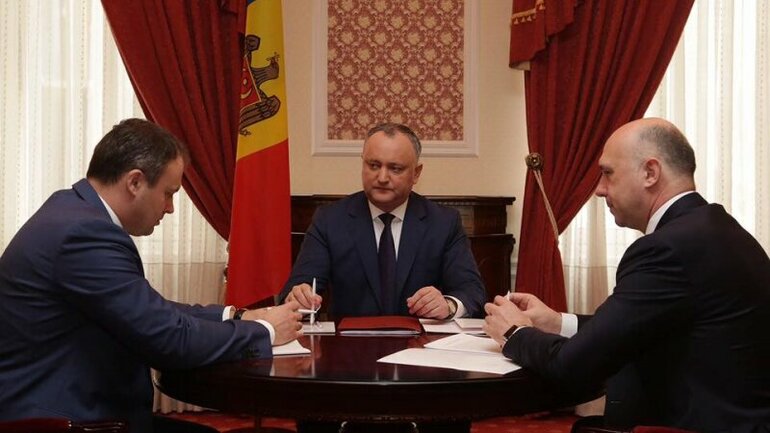Moldovan President Dodon and the Russian role model

The Republic of Moldova currently faces a deep political, if not geostrategic, rift. This becomes apparent when looking at the state leadership: a pro-European, liberal, but fairly discredited government on the one hand and a pro-Russian, conservative, but fairly obscure president on the other. While some analysts initially spoke of a Moldovan „cohabitation“, at least in the region the word now used is that of a „double-headed“ leadership.
President Igor Dodon came to power through direct elections in December 2016, as a result of a change of legislation. After a 2016 Constitutional Court decision, the Moldovan leadership decided to return to direct presidential elections (between 2000 and 2016 the state president had been elected by the Parliament).
Already as a Socialist presidential candidate, Dodon announced a number of Russia-friendly initiatives, among them the plan to sign a memorandum of cooperation with the Eurasian Economic Union (EAES) – a free trade area consisting of Russia, Belarus, Kazakhstan, Armenia and Kyrgyzstan. His political agenda, however, is less unequivocal. Ostensibly, Dodon adheres to a balanced approach, promising to maintain good ties with all sides. He claimed that a cooperation between Moldova and EAES would not represent a threat to the implementation of the EU-Moldova Association Agreement. “Moldova can only survive, if we have neither pro-European nor pro-Russian, but pro-Moldovan politicians”, the president stated in a Deutsche Welle interview after his inaugural visit to Brussels. And yet, his first visit as president-elect was to Moscow – the first visit by a Moldovan president to Russia in nine years, according to the presidential website. Dodon assured his Russian interlocutors that Moldova would cancel the Association Agreement with the EU as soon as the Party of Socialists (PSRM) would win the legislative majority. His main argument: Moldova lost the Russian market, while the volume of exports to the EU also decreased (Dodon, however, failed to mention that the EU invested hundreds of millions of Euros to develop the economy and public administration in the country).
Indicative of Dodon’s actual priorities is not only his political agenda. Also, in terms of institution-building and habitus he clearly follows the example of Putin’s Russia. His determination to expand presidential powers, he claims, responds to the popular will. On 27 February 2017, Dodon introduced a legislative initiative to amend Art. 85 of the Moldovan Constitution aimed at broadening the rights of the president to dissolve the Parliament, for example in cases when the Parliament refuses to implement the outcome of a referendum. Dodon accordingly plans to introduce two referenda: one legitimising and expanding the mandate of the president to dissolve the Parliament; the other repealing a law introduced by the government in 2016, which stipulates that the cost of returning the „stolen billion“ from the banking system should be borne by the citizenry (in 2014, Moldova was hit by a bank scandal, when $ 1 billion – approximately 12 % of the Moldovan GDP – disappeared from the bank system).
Although Moldova for the time being remains a parliamentary democracy with the president having limited powers, Dodon’s public and media presence suggests that the president has little interest in the delimitation of competencies.
Furthermore, the introduction of a Presidential Civil Society Council seems to be equally inspired by the Russian example. At the end of January 2017, the presidential administration announced that the new consultative body should foster the continuous dialogue and exchange of ideas and expertise between the president and civil society in the interest of the citizenry. In the same vein, Dodon has underlined repeatedly his proximity to the people (in February he started monthly meetings with the press and with individual citizens who can put questions, concerns and complaints to the president).
With regard to the Transdniestrian conflict, Dodon initially insinuated that he would favour a federal solution which traditionally has been advocated by Russia, placing emphasis on a special veto right for Transdniestria. Recently, however, he has refrained from mentioning the word “federalisation”. One reason could be that the “Transdniestrian question” seems to be the only topic on which president and government (which firmly opposes any kind of federal option) are prepared to look for a common position.
In one respect Dodon does not conform with Russian strategic policies: He rejects the presence of any foreign armed forces on Moldovan territory. Reason for that is his adherence to Moldova’s neutrality (enshrined in the constitution). Dodon is against the opening of a NATO liaison office in Chisinau, which was agreed upon in Brussels between Moldovan Premier Pavel Filip and NATO Secretary General Jens Stoltenberg in November 2016. Dodon’s dismissal of Minister of Defence and Liberal Party member, Anatol Salaru, an ardent advocate of NATO rapprochement, was a logical step in this regard.
There remains plenty of potential for conflict. On 24 January 2017, the Constitutional Court, calles upon by politicians of the Liberal Party, ruled that the president may only veto a prime minister’s candidate for a ministerial position once. The Court’s ruling thereby affirmed the primacy of the government over the presidency in Moldova’s political system. Dodon already announced that he will not abide by the ruling, claiming it represents “a rejection of the will of the people”.
Nadja Douglas is Research Associate of the Centre for East European and International Studies (ZOiS).